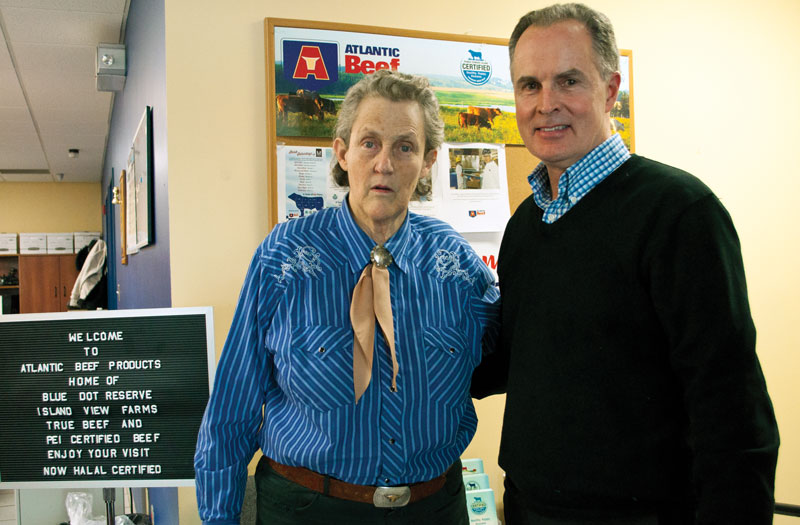When small is better: thoughts on niche markets for meat
World-renowned author, speaker, and animal welfare advocate Dr Temple Grandin, paid a visit to the Island’s beef processing plant, Atlantic Beef Products Inc. (ABPI). Visiting the Maritimes as the keynote speaker for the Maritime Beef Conference in Moncton, NB, she had just enough time for a whirlwind plant tour and a quick
Q & A session on a cloudy March afternoon at ABPI in Albany, PEI.
As a professor of animal sciences for Colorado State University, Dr Grandin is a designer of livestock handling facilities and is a leading expert on the ways to reduce stress on animals during handling, whether it is on a farm or in a meat plant. This was her first visit to ABPI, which is a Certified Humane plant. The Certified Humane designation was given after passing an inspection that uses Dr Grandin’s slaughter standards, with plant modifications made based upon her extensive research into humane practices for animal slaughter. As well, ABPI is the only the only federally inspected (CFIA) meat plant in the Maritimes.
She had praise for the work that ABPI is doing and recognizes that niche meat plants that concentrate on smaller, specialized yields fill a need in our food chain. “There’s a need for local food…One of the problems with putting all the eggs in one basket is ‘big is fragile’…For food security we need places like this,” she said when discussing the smaller size of ABPI (in comparison to many massive plants that process thousands of head of cattle per day, ABPI processes 500-550 head per week). Having a local processing plant working with Island cattle producers is ideal and she noted that in the US, there is a need for good, small plants like ABPI. “As I go around the world, there’s definitely a place for plants like this to get in a niche that commodity beef or commodity anything can’t get into. There’s a place for both—there’s been a tendency in the industry for Big Ag and Little Ag to throw rocks at each other, I think that just stupid, because there’s a place for both,” she bluntly stated.
Among other things, she touched upon the issues of getting young people interested in agriculture and in animal farming, the need to get cattle back on the land as part of crop rotations and to help build up soil health, and suggested that “Big Ag is going to learn from Little Ag. Little Ag is going to be the pioneers. First of all Big Ag will stick their nose up, and then copy it. Little Ag on innovation will lead innovation…Little guys innovate. I don’t care what industry you’re in, little guys innovate. The big boys don’t. That’s true for every industry, no matter what it is.”
Dr Grandin’s expertise in cattle rearing and her passion for animal welfare was evident in every story she shared and every piece of advice she offered. She emphasized the need for good stewardship of animals on each and every farm. Ensuring that cattle and other livestock have adequate bedding materials in the barns, that their body conditions are tracked and scored so to ensure that animals that may be ill are not neglected, keeping animals clean, and watching for swollen joints and measuring ammonia levels in barns were issues she touched on. She adamantly advocates for an animal welfare scoring system that allows producers to “manage what you measure.”
- WTF - December 2, 2020
- WHAT GOES AROUND COMES AROUND - June 12, 2020
- Salty’s 2020 Gift Guide - December 2, 2020
- A RETURN OF DELIVERY - May 6, 2020
- ICYMI - April 22, 2020
- NEW BIOMASS BOILERS FOR LOCAL GREENHOUSE - March 31, 2020
- TOP CHEF CANADA COMPETITOR FROM PEI - March 4, 2020
- FOOD INSECURE - March 1, 2020
- ACCESS TO FRESH PRODUCE - March 1, 2020
- POLITICS OF SCHOOL FOOD - March 1, 2020


